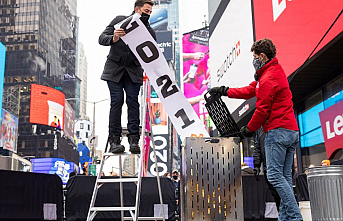NEW YORK -- A jury in suburban New York ruled Thursday that drugmaker Teva Pharmaceuticals contributed the opioid crisis. It was one of a few verdicts among the thousands of lawsuits involving painkillers nationwide.
The case will be heard in a separate court. Teva and two Long Island counties were involved in the investigation.
A jury from Suffolk County convicted the drug company of causing what is legally called a public nuisance, but with lethal consequences. The opioid epidemic was responsible for more than 500,000 deaths over the last two decades.
James, a Democrat, stated in a press release that "Teva Pharmaceuticals USA" and other companies misled Americans about the dangers of opioids. "Today we made a significant step towards correcting the many wrongs that this country has suffered over the past two decades."
Teva, a company that makes opioids with fentanyl in Israel, stated it disagrees with the verdict and plans on appealing.
The company stated in a statement that "the plaintiffs did not present any evidence of medically unnecessary prescriptions, suspicious orders or diverted orders, nor did they show that Teva's marketing caused damage to New Yorkers." The company is also asking for a mistrial based on several issues.
Teva's stock that is U.S. listed fell 6.3% after the verdict was announced. It ended at $7.90.
The painkillers have been sued by many people across the country: state and local governments, Native American tribes and unions, as well as school districts and other district officials.
The lawsuit in New York, filed in 2019, was against several opioid distributors and producers, which are companies that purchase large quantities of medication and then sell it to pharmacies.
Drug companies were accused of violating their legal obligations "to profiteer form the plague they knew was coming." The state and the counties claimed that drug producers conspired to deceive people and downplay the serious consequences of opioid addiction. They also said that drug distributors evaded systems that limit painkiller orders.
Teva is well-known for its generic drugs. However, the lawsuit was focused on Actiq, Fentora and Fentora which are two brand-name fentanyl medications approved for certain cancer patients. The lawsuit stated that Teva promoted them for more types of pain in a "deceptive, dangerous marketing strategy".
They try to claim they are selling legal products. "The problem is that they're illegally selling them," Hunter Shkolnik, a lawyer representing Nassau County, stated at a Thursday virtual news conference. "The jury found that they are doing wrong,"
Teva stated Thursday that it continues to concentrate on increasing access to essential medications for patients and believes a national settlement is in the best interests of patients.
New York claimed that the state was liable for hundreds of millions in addiction treatment costs and other expenses due to the actions of the opioid companies named in suit. The lawyers for the counties suggested that Teva could be held responsible for damages in excess of tens to billions of dollars.
Jayne Conroy, Suffolk County's attorney, stated that "the numbers are staggering", how much it has cost our community and what it will cost us in the future." The virtual news conference featured information about emergency services for victims of overdose, as well as drug rehabilitation programs, and other topics.
After other defendants settled, Teva was the only remaining manufacturing defendant. New York has received $1.5 billion in settlements.
The trial began months ago. The jury began deliberating Dec. 14 and took some time off to celebrate Christmas.
The outcome of opioid cases in other jurisdictions is unclear.
A judge in Oklahoma ruled in favor of Johnson & Johnson in 2019. However, the Supreme Court of Oklahoma overturned that ruling in November. A California judge had ruled in favor Teva and drugmakers a week before.
Then, in Cleveland, a federal jury sided with Ohio county governments who had filed claims against pharmacie chains.
Some observers believed that the Oklahoma and California rulings would end the possibility of opioid lawsuits being brought to court by state public nuisance laws, according to Carl Tobias, University of Richmond law professor, who has been following the litigation across the country.
Tobias stated, "But now we're seeing that that's false," at least in certain places. Tobias suggested that Thursday's ruling might reenergize such suits.
Although a trial in West Virginia has concluded, a judge has yet to rule in the case. A Washington trial is still ongoing. Many other cases are awaiting trial.
Settlements have also occurred. There have been settlements across the country for some of the most prominent industry names, including distributors AmerisourceBergen and Cardinal Health, McKesson, and drugmakers Johnson & Johnson and Mallinckrodt Pharmaceuticals. These settlements could potentially be worth more than $30 billion. The majority of the money will be used to combat the epidemic.
However, most of these deals are still in flux and one major reversal has occurred. A federal judge rejected Purdue Pharma, OxyContin maker,'s massive deal to settle thousands more lawsuits regarding the use of opioids.












